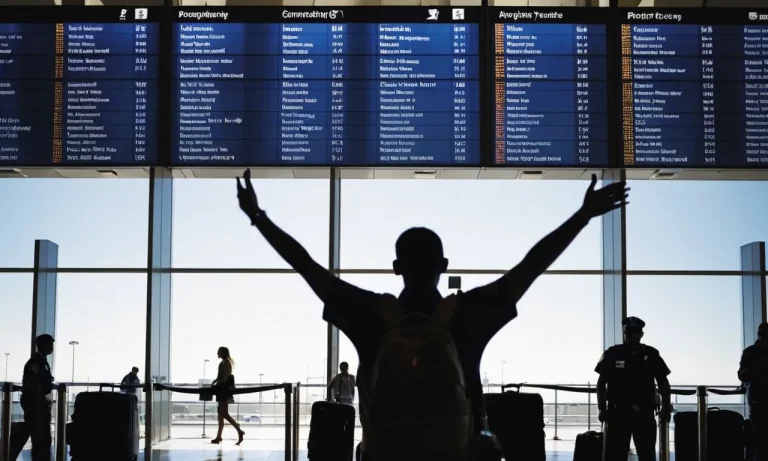When Airfare Must Be Ticketed: A Comprehensive Guide
Booking flights can be confusing, especially when it comes to ticket time limits. If you don’t ticket your airfare by the deadline, you risk losing your fare or having to pay more later.
The quick answer is that most airlines require you to ticket airfare within 24 hours of booking. However, this can vary between airlines and fare types.
In this comprehensive 3000+ word guide, we’ll cover everything you need to know about ticketing time limits for airfare, including:
Background on Airfare Ticketing Rules
Understanding the background of airfare ticketing rules is essential for travelers to navigate the complex world of airline bookings. Over the years, the airline industry has undergone significant changes, shaping the way ticketing is done today.
Airline industry history and changes over time
The airline industry has evolved tremendously since its inception. From the early days of commercial aviation, when only a handful of airlines operated, to the present, where hundreds of carriers compete for passengers worldwide, the industry has seen remarkable growth.
With the advent of low-cost carriers and the increased accessibility of air travel, ticketing rules have become more varied and nuanced. Airlines have implemented different fare structures, baggage policies, and cancellation/change rules to cater to the diverse needs of travelers.
For example, some airlines offer basic economy fares with limited amenities at lower prices, while others provide premium services and flexibility for a higher cost. It’s crucial for passengers to familiarize themselves with these changes to make informed decisions when booking their flights.
Role of global distribution systems (GDS)
Global Distribution Systems (GDS) play a vital role in the ticketing process. These computerized networks enable travel agents and online booking platforms to access real-time flight information, availability, and pricing from multiple airlines.
GDS platforms, such as Amadeus, Sabre, and Travelport, act as intermediaries between airlines and travel sellers, facilitating the distribution of tickets. They provide a centralized and efficient system for ticketing, ensuring accurate and up-to-date information is available to both industry professionals and travelers.
By utilizing GDS, airlines can reach a broader audience and streamline their ticketing processes, while travelers can compare prices and make bookings more easily.
Standard ticketing guidelines between airlines
While each airline may have its own specific ticketing rules, there are some standard guidelines that apply across the industry. These guidelines ensure consistency and transparency in the ticketing process.
For example, airlines typically have rules regarding ticket issuance, including the requirement to issue a ticket within a specified time frame after booking. Additionally, most airlines have policies regarding ticket changes, cancellations, and refunds, although the specifics may vary.
It’s essential for travelers to carefully review the terms and conditions of their ticket before making a purchase. Understanding the rules and restrictions can help avoid unexpected fees or complications during the journey.
For more detailed information on airline ticketing rules, it is advisable to visit authoritative websites such as International Air Transport Association (IATA) or specific airline websites, as they provide comprehensive information on ticketing policies and procedures.
When Specific Airlines Require Ticketing
Delta ticketing time limits
When booking a flight with Delta Air Lines, it’s important to be aware of their ticketing time limits. Delta generally requires ticketing to be completed within 24 hours of making the reservation. However, there are some exceptions to this rule.
For example, if you are booking a flight within 14 days of departure, Delta may require immediate ticketing. This means that you will need to purchase your ticket right away to secure your reservation.
It’s always a good idea to check Delta’s specific ticketing requirements for your particular itinerary.
American Airlines ticketing deadlines
American Airlines also has specific ticketing deadlines that passengers must adhere to. In most cases, ticketing must be completed within 24 hours of making the reservation. However, there are a few exceptions to this rule.
If you are booking an American Airlines flight through their website or app, you may have up to 24 hours to complete your ticketing. This allows you to hold a reservation without payment for a short period of time.
However, if you are booking through a travel agent or third-party website, the ticketing deadline may be different. It’s important to double-check the ticketing requirements when booking with American Airlines.
United Airlines ticket expiry rules
United Airlines has specific rules regarding ticket expiry. Generally, tickets must be purchased within 24 hours of making the reservation. However, there are a few exceptions to this rule.
If you are booking a flight with United Airlines and select their “Hold” option, you can hold your reservation without payment for a specific period of time. This allows you to secure your itinerary while you finalize your travel plans.
It’s important to note that the hold period may vary depending on the fare class and destination.
Additionally, United Airlines offers the option to purchase a flexible fare, which allows you to change your flight without a change fee. This can be helpful if you are unsure about your travel dates and need flexibility.
Southwest Airlines booking policies
Southwest Airlines has unique booking policies compared to other airlines. Unlike most carriers, Southwest does not have specific ticketing time limits or deadlines. They have a different system called “Reservation System Ticketing Time Limit” (RSTTL).
With Southwest, when you make a reservation, you will receive a confirmation number. You must then purchase the ticket before the RSTTL expires. The RSTTL varies depending on the type of fare you choose and the date of departure.
It’s important to check the RSTTL for your specific reservation to ensure you don’t miss the deadline.
It’s worth noting that Southwest offers flexibility with their tickets. If you need to change or cancel your flight, you can do so without incurring any change fees. This can be a great advantage if your travel plans are uncertain.
Ticketing Time Limits by Fare Type
Differences between refundable and nonrefundable tickets
When it comes to ticketing time limits, there are some important distinctions to be made between refundable and nonrefundable tickets. Refundable tickets often come with more lenient time limits, allowing passengers to make changes or cancellations without incurring hefty fees.
On the other hand, nonrefundable tickets tend to have stricter time limits, which means passengers must finalize their travel plans within a certain timeframe.
For example, let’s say you’ve purchased a nonrefundable ticket for a trip. Typically, you may have to make the necessary arrangements within 24 to 48 hours. If you fail to do so, the ticket may become void, and you may lose the opportunity to travel on that particular booking.
It’s important to carefully read the terms and conditions of your ticket to understand the specific time limits associated with it.
First class vs economy ticketing
When it comes to ticketing time limits, there may also be differences between first class and economy tickets. First class tickets often offer more flexibility in terms of ticketing time limits compared to economy tickets.
This is because first class passengers typically pay a higher fare, which may include additional benefits such as the ability to make changes or cancellations closer to the departure date.
On the other hand, economy tickets may have stricter ticketing time limits. Airlines may impose tighter deadlines for economy passengers in order to manage their flight inventory efficiently. It’s important to keep this in mind when booking your ticket and ensure that you understand the specific time limits associated with your chosen fare class.
Award travel ticketing limitations
Award travel, which involves redeeming frequent flyer miles or points for a ticket, may also come with its own set of ticketing limitations. While these limitations can vary depending on the airline and frequent flyer program, it’s important to be aware of the restrictions that may apply to award travel bookings.
Some airlines may have limited availability for award travel, especially during peak travel periods. This means that you may need to book your award ticket well in advance to secure your desired travel dates.
Additionally, there may be specific time limits for ticketing award travel, and failure to adhere to these limits may result in the loss of your award ticket.
To ensure a smooth booking process and to avoid any disappointment, it’s always a good idea to familiarize yourself with the ticketing time limits associated with award travel. Check the terms and conditions of your frequent flyer program and reach out to the airline for any clarifications if needed.
What Happens If You Miss The Deadline
Losing your fare and having to rebook
Missing the ticketing deadline can have significant consequences, and one of them is losing your fare altogether. Airlines often have strict policies regarding ticketing deadlines, and if you fail to meet them, they may cancel your reservation.
This means you will have to rebook your flight, potentially at a higher price. It’s essential to pay attention to the ticketing deadline provided by the airline and ensure you complete the necessary steps in time to avoid this inconvenience.
Paying fare difference or change fees
In addition to losing your fare, missing the ticketing deadline may also result in having to pay fare difference or change fees. If you need to rebook your flight after missing the deadline, the airline may charge you for any fare difference between your original ticket and the new one.
Additionally, they might also impose change fees, which can add up to your overall expenses. To avoid these additional costs, it’s crucial to be mindful of the ticketing deadline and complete the necessary procedures within the specified timeframe.
Using credits for future travel
If you miss the ticketing deadline but have purchased a refundable ticket or have any credits with the airline, you may still have some options. Airlines often allow passengers to use the value of their ticket as credits for future travel.
This means that even if your reservation is canceled due to missing the deadline, you can utilize the amount you paid towards a future flight. However, it’s essential to check with the airline’s policies and any restrictions that may apply to ensure you can take advantage of this option.
It’s worth noting that each airline may have different policies and procedures regarding missed ticketing deadlines. Therefore, it’s always wise to review the terms and conditions of your specific airline and ticket before making any assumptions.
Staying informed and proactive can help you avoid the consequences of missing the ticketing deadline and ensure a smoother travel experience.
Tips to Avoid Issues with Ticketing Deadlines
Set calendar reminders when booking
One way to avoid missing ticketing deadlines is to set calendar reminders when you book your flights. With the excitement of planning a trip, it’s easy to forget about the time constraints associated with ticketing.
By setting a reminder on your phone or computer, you can ensure that you don’t overlook the deadline and risk losing your reservation. This simple step can save you from potential stress and disappointment later on.
Allow extra time for award travel
If you’re booking an award ticket using frequent flyer miles or points, it’s important to allow extra time for ticketing. Award travel often involves additional steps and requirements, such as verifying your eligibility and waiting for confirmation from the airline.
These processes can take longer than booking a regular ticket, so it’s advisable to start the process well in advance. By giving yourself extra time, you can avoid any last-minute rush and increase your chances of securing your desired flights.
Call airline if you need an extension
If you find yourself nearing the ticketing deadline and need more time, don’t panic. Instead, reach out to the airline directly and explain your situation. Airlines understand that unexpected circumstances can arise, and they may be willing to grant you an extension, especially if you have a valid reason.
Calling the airline and speaking to a customer service representative can help you find a solution and ensure that you don’t lose your reservation. Remember, being polite and respectful goes a long way in these situations.
By following these tips, you can avoid issues with ticketing deadlines and ensure a smooth travel experience. Remember to stay organized, allow extra time for award travel, and communicate with the airline if you need an extension.
With these proactive measures in place, you’ll be able to focus on enjoying your trip without any last-minute complications.
Conclusion
Understanding airline ticketing time limit policies is crucial to avoid losing out on fares or travel plans. While 24 hours is standard, rules can vary greatly depending on airline, fare type, and other factors.
By keeping ticketing deadlines on your radar when booking flights, allowing extra time for complex itineraries, and requesting exceptions if needed, you can make sure your airfare is ticketed properly for your upcoming trips.








